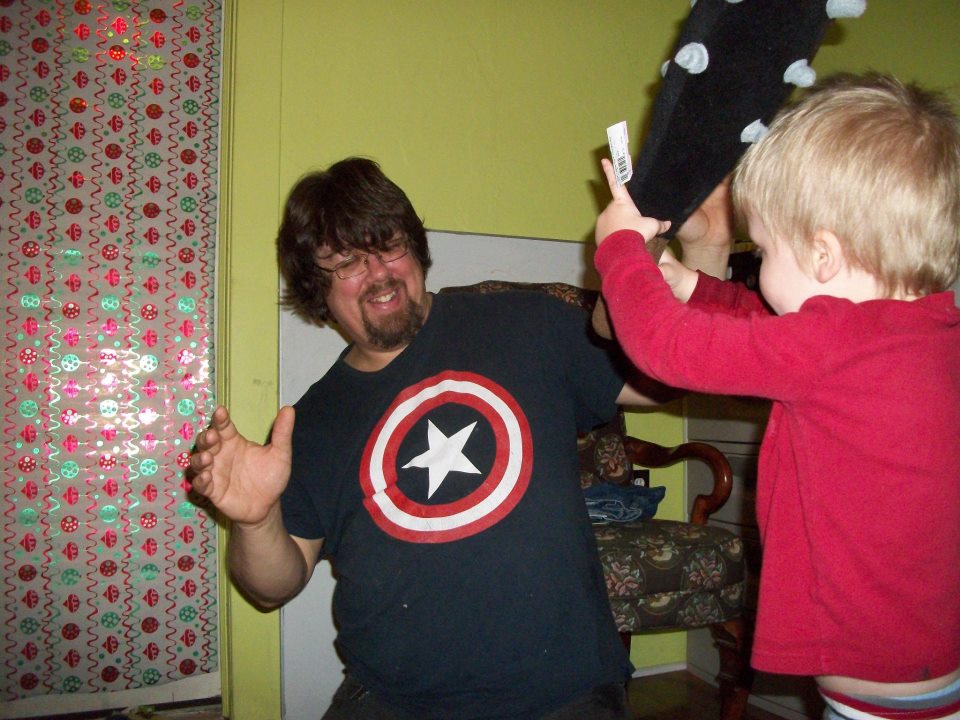Origin Stories: Indie Novelist Tony Breeden
For those of us who seem hard-wired for wonder, the church can often be more of a hindrance to creativity than a help, but I can’t help thinking our Creator, the paragon of creativity, meant us to be so much more.
I guess it all began with nursery rhymes, fairy tales and Bible stories. Whether I was listening to a rhyme about Jack jumping over a candlestick, the story of two poor children outwitting a cannibal witch, the account of God parting the Red Sea for Moses and the Israelites to escape the armies of Pharaoh, or the tale of how Robin Hood won the golden arrow, I was left with a sense of wonder.
Hard-wired for wonder
Looking back, I think I must have been hard-wired for wonder.
I was one of those kids with an incredibly overactive imagination. I could see the stories like a movie playing out in my head. So it’s probably little wonder that I’ve always been drawn to science fiction. There’s a lot floating around in my head from my childhood and teen years: books by folks like Margaret Weis and Tracy Hickman, Harry Harrison, Piers Anthony, Anne McCaffrey and others. Movies and TV shows like Star Wars, Doctor Who, Star Trek, Battlestar Galactica, Blade Runner, Total Recall, Terminator, Godzilla kaiju movies … gorgeous films touched by masters like Ray Harryhausen, George Lucas, Steven Spielberg, Ridley Scott and James Cameron. It’s all in there, along with more comic books, Saturday morning cartoons, and action flicks than I care to think about. For crying out loud, my favorite Christmas movie is Die Hard.
Now I freely admit that I rebelled against the church and went the whole prodigal route. I usually summarize that part of my testimony as “For nine years, I was a fool.” Some folks assume that my penchant for dragons and Daleks and other general weirdness contributed to that decision. Don’t get ahead of yourself. My reasons for leaving were varied, but one of those reasons was how the church tends to deal with creativity.
I’ve said this many times, but it bears repeating: It ought to be considered a sin to make the living breathing Word of God boring. First and foremost, the Bible is a book of Wonders, which is little wonder (pun intended) if you stop to consider how very creative its Chief Author is. The God we serve created the heavens and the earth and all that is in them in six short days … and even had time at the end of each day to appreciate His own handiwork and place His personal stamp of approval on it. When we look at the night shy through a telescope or the incredibly tiny worlds captured between the slides of a microscope, we see the level of detail and grandeur of which the ultimate Creative Type is capable of. We admire Tolkien for the influence his work as a linguist had upon his stories, but it was God who spoke first, and who first imagined not only human language, but whale and bird song and the dancing language of bees.
Yet Christianity has not always embraced creativity. For example, when I was a teenager in a Baptistic Christian school, I was told that I couldn’t draw a T-rex because the teacher thought it looked demonic. I’ll admit that T-rexes are scary-looking (it’s the teeth!), but not everything that looks scaly and predatory is a demon, y’all. My well-meaning teacher wasn’t really sure what to do with a creative young mind who was obsessed with dinosaurs and dragons, so she did what a lot of Christians and churches do when faced with creativity: she banned it. But folks, we serve the Creator, the paragon of creativity. When He came to this earth, He had the option of giving us more programs and prohibitions, but the Master Teacher chose creative teaching stories (parables) instead. Stories, like songs, tend to stick with you, making their lessons easy to recall and generalize to new situations.
If we’re called to walk in His steps, why aren’t churches at the vanguard of creativity? Why does the introduction of new music into the church service produce civil warfare rather than encouragement the musicians’ expression of praise and worship? Why is a lot of religious artwork so, well, predictable?
I once saw something in an art museum that has always stood out to me. The artist had restored an old psaltery box, which was beautiful in its own right, but had left the back end open and jagged. It almost looked as if something had exploded from within. The piece was called “God in a Box.”
Let. That. Sink. In.
In any case when I came back to the fold, I ran into a little problem. Christian movies, even when they concern something as inarguably cool as the End of Days, are just flat-out weak. They’re getting better; I’m hoping for Christian B-movies soon.
My decision to start writing came as a direct result of browsing the near-exclusive sea of romance novels of the local Christian bookstores. I remember thinking, “Why should I be forced to get the stuff I actually enjoy reading from secular bookstores in novels written from a non- or even anti-Christian worldview?”
Hard-wired for sci-fi
 Science fiction is the thinking man’s genre. The success of the Left Behind series demonstrated how influential exploratory fiction could be in shaping and reinforcing beliefs concerning eschatology. I realized that apologetics fiction could do the same for evangelical convictions concerning our origins. With that in mind, I set out to tell a great sci-fi story that gave a plausible young earth creationist explanation of comic book super powers rather than the prevalent evolutionary assumption of beneficial mutations, popularized in the X-Men movies and on TV shows like Heroes. The result was Johnny Came Home.
Science fiction is the thinking man’s genre. The success of the Left Behind series demonstrated how influential exploratory fiction could be in shaping and reinforcing beliefs concerning eschatology. I realized that apologetics fiction could do the same for evangelical convictions concerning our origins. With that in mind, I set out to tell a great sci-fi story that gave a plausible young earth creationist explanation of comic book super powers rather than the prevalent evolutionary assumption of beneficial mutations, popularized in the X-Men movies and on TV shows like Heroes. The result was Johnny Came Home.
I owe a great debt to Frank Peretti and C.S. Lewis, who showed us that we could tell great stories, deal with doubts and questions, and encourage others in their Christian faith at the same time. Exploratory fiction also gives Christians a voice into the future that we’ve largely left to those antagonistic to the faith. Science fiction is often either hostile or ambivalent to Christianity because we let folks with other worldviews dominate the genre and imagineer the future for us — and as a result many folks feel that in some way religion will become increasingly irrelevant!
I have no idea how we let it come to this, but thankfully there a lot of great Christian writers who are changing that. Folks like Tim Chaffey, Joe Westbrook, Sean T. Smith, Robert Mullin, Allan Reini, and so many others besides myself are creating worlds where we can explore answers to the problems Christianity might face in the future and how the church will look if Christ delays a few more centuries (or more). I’m excited to be a part of this growing movement of what fellow author J.C. Lamont terms “literary apologists.”







































Thanks for the article. Reminds me of a lecture I heard at Cornerstone one year. The instructor said that artistically, we follow the trends set by the world. But the world should be following us. We serve and are coming to know the creative God. The source and the final.
The original Creator, in every sense of the word.
The creativity problem is a worldly thing, brought about by the need of leadership to feel like they’re in control. For the same reason that most institutional churches shut down the Holy Spirit, church corporations hate creativity. They can’t understand it, and it threatens their hold on the leadership.
And never tell them that the Holy Spirit should be in charge of the worship services and that it’s really Jesus’ church.
>stumbling on my face off the soapbox< 🙂
You hit the nail on the Head, David. It is a worldly thing. Paul would have said it like this:
“20Wherefore if ye be dead with Christ from the rudiments of the world, why, as though living in the world, are ye subject to ordinances, 21(Touch not; taste not; handle not; 22Which all are to perish with the using;) after the commandments and doctrines of men? 23Which things have indeed a shew of wisdom in will worship, and humility, and neglecting of the body; not in any honour to the satisfying of the flesh.”
-Colossians 2:20-23.
;]
I’m sorry to hear people tried shutting your creativity down at various stages of your life. There’s a story you might find satisfying and even soothing or healing
!
It’s by Nathaniel Hawthorne: “The Artist of the Beautiful.” Take the link and scroll down. It’s the final story in the list.
As they say at Walgreen’s now, be well.
Thanks. I’ll check it out ;]
I really get this. It was the same way for me too, except I just hid my loves from my church, and didn’t really make any deep bonds with other Christians due to it. I didn’t really have any scriptural reason for it at the time, because consuming creative works and thinking creatively is like breathing air to me. I simply cannot do without it.
I think the church dislikes creatives and science because both of those were used by the secular world to attack it. The Byronic ideal of the artist as morally transgressive truth teller wound up setting them up against the faith, and even the “heroic individualist” idea made a lot of Christian artists isolate themselves because that’s what artists do. So the church is wary about the arts in the same way a deer is wary about humans; they can’t always tell which one will attack and which one is friendly.
I would ask why you’re waiting for Christian B-movies when it seems like all Christian movies fit pretty well in the B-slot.
And on a more philosophical note, I wonder if the problem with creativity in evangelical Christendom is the lengths to which we’ve taken sola scriptura. I won’t debate the wisdom of cutting out liturgy, but liturgy fills a creative slot that nothing else readily fits: letting loose one’s Jesus-feels and creative-feels at the same time. Coincidentally, it satisfies that weird yearning some of us have for ritual that sola scriptura also tends to starve. (This is another reason I’m not Calvinist.)
I actually think most Christian films score below the B-movie line.
As for sola Scriptura, I manage to be quite creative even though I adhere to the 5 solas of the Protestant Reformation. ;]
Oh, I’m not worried about your creativity, no matter how five-pointy you are. 😛
Undoubtedly, and I don’t think that’s even very controversial around here — the idea that all we need is the Bible is what leads to condemnation of the arts and “wrongful pragmatism.” To me the question is, in what way have we taken sola scriptura too far?
Sola scriptura can starve creative yearning — as when Young Earth theory makes it heretical to indulge in the sense of wonder driven by unimaginably massive eons of time. (That chronology-based wonder is important to both fantasy and science fiction. Tolkien sort of presupposed Old Earth catastrophism, and LotR loses much of its power if we’re not allowed to pretend that Middle Earth might really have been our Earth an unknown number of millennia before the Garden of Eden.)
Good observation about liturgy!
bainespal,
It is unfortunate, but I couldn’t disagree with you more. I’m a young earth creationist [as I mention in the article] and this has in no way limited my imagination regarding God’s creation, much less writing and appreciating sci-fi and fantasy. [The recent Hobbit films on the other hand…]. I’m not sure that protecting the viability of a fictional timeline is a rational reason for abandoning sola Scriptura
I think it is a grave mistake to abandon sola Scriptura, for if we abandon the Bible as our ultimate authority, what do we replace it with? Since we decide what portions of the Bible are authoritative and which are not, we place ourselves as the ultimate authority over God’s Word. In the process of making these decisions to give up this portion of the Bible or that as authoritative, we must needs echo the question of the Serpent, “Did God really say that?” That’s what we call a bad precedent.
My point is this: don’t throw out the baby with the bathwater. Yes, the church has misused the Bible to smother creativity, but that doesn’t mean we chuck it as the ultimate authority.
Respectfully,
Tony Breeden